Should I Be a Sugar Baby if Im a Virgin
Is sugar really bad for you?
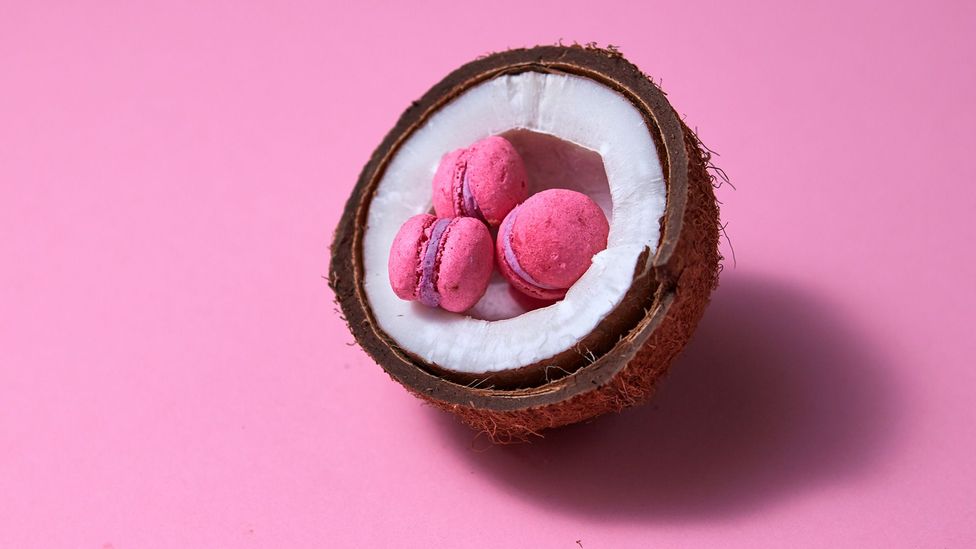
People who eat more sweets are at higher gamble of blazon 2 diabetes, heart illness and cancer… merely that may non actually be carbohydrate's mistake. BBC Future investigates the latest findings.
G
Given the electric current situation, many of u.s.a. are more interested than e'er in how food can (and can't) support our wellness. To assistance yous sort out fact from fiction, BBC Future is bringing back some of our virtually popular nutrition stories.
Our colleagues at BBC Good Nutrient are also focusing on applied solutions for ingredient swaps, nutritious storecupboard recipes and all aspects of cooking and eating during lockdown.
It'southward difficult to imagine now, just there was a time when humans only had access to sugar for a few months a year when fruit was in season. Some 80,000 years ago, hunter-gatherers ate fruit sporadically and infrequently, since they were competing with birds.
At present, our sugar hits come up all yr round, often with less nutritional value and far more easily – by simply opening a soft drink or cereal box. Information technology doesn't take an skillful to see that our modern sugar intake is less healthy than it was in our foraging days. Today, sugar has become public health enemy number one: governments are taxing it, schools and hospitals are removing it from vending machines and experts are advising that nosotros remove information technology completely from our diets. It has fifty-fifty been blamed for possibly increasing the risk of contracting infections considering information technology allegedly suppresses the immune system, although in reality the affect it has on our ability to fight off diseases is a great deal more complicated than that.
And and then far, scientists have had a difficult fourth dimension proving how it affects our wellness, contained of a diet too high in calories. A review of research conducted over the last five years summarised that a diet of more than than 150g of fructose per day reduces insulin sensitivity – and therefore increases the risk of developing wellness problems similar high claret pressure and cholesterol levels. Only the researchers besides concluded that this occurs well-nigh often when high sugar intake is combined with excess calories, and that the furnishings on health are "more than probable" due to sugar intake increasing the hazard of excess calories, not the bear upon of carbohydrate alone.
Meanwhile, there is too a growing argument that demonising a single food is dangerous – and causes confusion that risks us cutting out vital foods.
Sugar, otherwise known as "added saccharide", includes tabular array saccharide, sweeteners, honey and fruit juices, and is extracted, refined and added to food and drinkable to improve taste.

The term 'sugar' includes a broad array of sweeteners, including the fructose naturally found in fruit (Credit: Getty)
Only both complex and unproblematic carbohydrates are made up of sugar molecules, which are cleaved down by digestion into glucose and used by every cell in the body to generate energy and fuel the brain. Complex carbohydrates include wholegrains and vegetables. Simple carbohydrates are more hands digested and quickly release sugar into the bloodstream. They include sugars found naturally in the foods we eat, such as fructose, lactose, sucrose and glucose and others, like high fructose corn syrup, which are manmade.
You might also like:
• Are bogus sweeteners really bad for united states of america?
• We don't need most as much poly peptide equally we consume
• The world's most nutritious foods
Before the 16th Century but the rich could afford sugar. But it became more bachelor with colonial trade.
And so, in the 1960s, the development of big-scale conversion of glucose into fructose led to the cosmos of high fructose corn syrup, a concentrate of glucose and fructose.
This strong combination, in a higher place any other single type of sugar, is the one many public health advocates consider the about lethal – and information technology is the 1 that many people recollect of when they think of "sugar".
Sugar blitz
Consumption of high fructose corn syrup in the U.s.a. increased tenfold between 1970 and 1990, more than any other food group. Researchers take pointed out that this mirrors the increase in obesity beyond the country.

Some researchers believe that once high fructose corn syrup became so common, an obesity crisis was but a matter of time (Credit: Getty)
Meanwhile, sugary drinks, which usually apply high fructose corn syrup, accept been central to research examining the effects of sugar on our health. One meta-analysis of 88 studies institute a link between sugary drinks consumption and body weight. In other words, people don't fully compensate for getting energy from soft drinks by consuming less of other foods – perhaps because these drinks increase hunger or decrease satiety.
But the researchers concluded that while the intake of soft drinks and added sugars has increased alongside obesity in the US, the information only represents wide correlations.
And not everyone agrees that high fructose corn syrup is the driving cistron in the obesity crisis. Some experts signal out that consumption of the carbohydrate has been declining for the past ten years in countries including the U.s.a., even while obesity levels have been rising. There also are epidemics of obesity and diabetes in areas where in that location is little or no high fructose corn syrup available, such equally Australia and Europe.
High fructose corn syrup isn't the only kind of sugar seen equally problematic. Added sugar, particularly fructose, is blamed for a variety of issues.
For one, it'southward said to cause heart disease. When liver cells intermission downwardly fructose, one of the end products is triglyceride – a class of fat – which can build upwards in liver cells over time. When information technology is released into the bloodstream, it tin contribute to the growth of fat-filled plaque inside artery walls.

Fructose, which naturally occurs in fruit and is a cardinal component of high-fructose corn syrup, can contribute to the growth of plaque in arteries (Credit: Getty)
1 fifteen-yr study seemed to back this upwardly: it found that people who consumed 25% or more of their daily calories as added sugar were more than than twice as probable to die from middle disease than those who consumed less than x%. Blazon ii diabetes as well is attributed to added sugar intake. 2 large studies in the 1990s found that women who consumed more than i soft drink or fruit juice per twenty-four hours were twice equally likely to develop diabetes as those who rarely did and then.
Sweet nothings?
But once more, it'south unclear if that means saccharide really causes heart disease or diabetes. Luc Tappy, professor of physiology at the University of Lausanne, is one of many scientists who debate that the primary cause of diabetes, obesity and high blood pressure is excess calorie intake, and that sugar is simply one component of this.
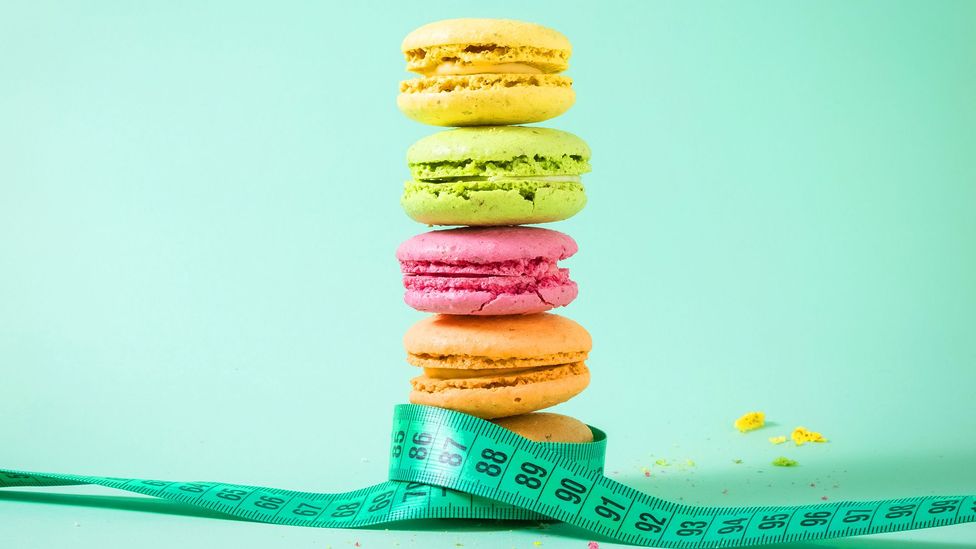
Many scientists believe that carbohydrate lone doesn't cause obesity – but that, instead, sugar ofttimes is role of a diet with too high of a calorie intake in general (Credit: Getty)
"More than energy intake than energy expenditure volition, in the long term, pb to fat deposition, insulin resistance and a fatty liver, whatever the diet composition," he says. "In people with a high free energy output and a matched energy intake, even a high fructose/sugar diet will exist well tolerated."
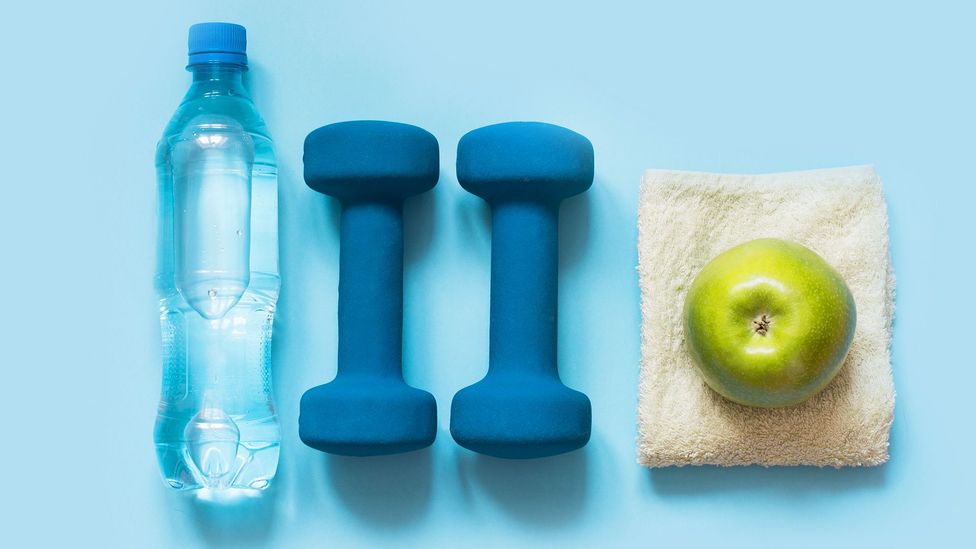
Athletes ofttimes consume more than sugar than other people, but because they metabolise information technology during exercise, they even so accept lower rates of cardiovascular disease (Credit: Getty)
Overall, evidence that added saccharide directly causes type 2 diabetes, heart disease, obesity or cancer is sparse. Yes, higher intakes are associated with these conditions. But clinical trials have yet to establish that it causes them.
Sugar also has been associated with habit… but this finding, too, may not be what it seems. A review published in the British Journal of Sports Medicine in 2017 cited findings that mice can experience carbohydrate withdrawal and argued that sugar produces similar effects to cocaine, such as craving. But the paper was widely accused of misinterpreting the evidence. One fundamental criticism was that the animals were restricted to having saccharide for two hours a day: if you allow them to accept it whenever they want it, which reflects how nosotros consume it, they don't show addiction-like behaviours.
Still, studies have demonstrated other ways in which sugar affects our brains. Matthew Pase, research fellow at Swinburne'southward Middle for Human Psychopharmacology in Australia, examined the association between self-reported sugary potable consumption and markers of encephalon wellness determined by MRI scans. Those who drank soft drinks and fruit juices more frequently displayed smaller average encephalon volumes and poorer retention function. Consuming two sugary drinks per day aged the brain two years compared to those who didn't drink any at all. But Pase explains that since he only measured fruit juice intake, he tin can't be sure that saccharide alone is what affects brain health.
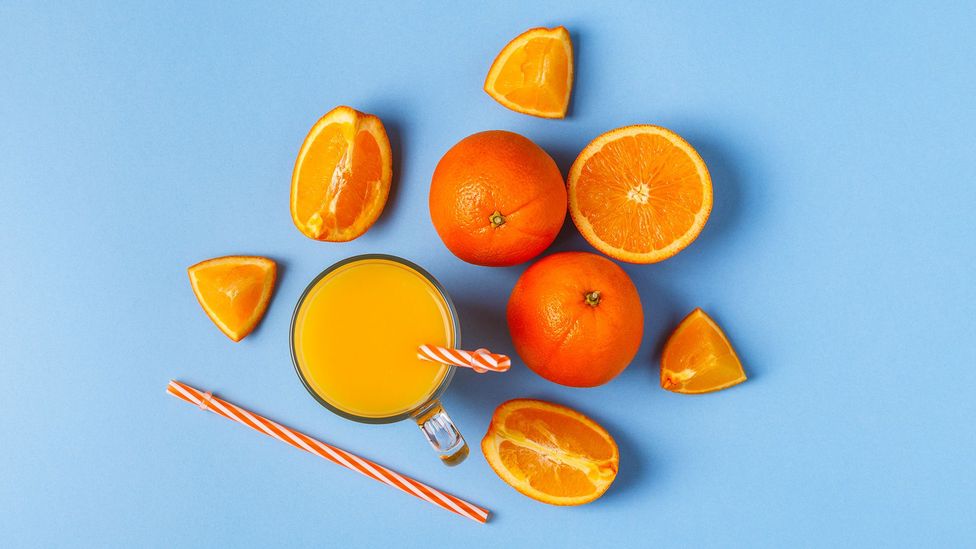
1 report establish that consuming ii juice drinks per twenty-four hours aged the encephalon by two years, compared to not drinking any (Credit: Getty)
"People who potable more than fruit juice or soft drinks may share other dietary or lifestyle habits that relate to brain health. For example, they may besides exercise less," Pase says.
I recent study found that sugar may fifty-fifty help improve memory and operation in older adults. Researchers gave participants a drinkable containing a modest amount of glucose and asked them to perform various memory tasks. Other participants were given a drink containing artificial sweetener every bit a control. They measured the participants' levels of engagement, their memory score, and their own perception of how much endeavour they'd applied.
The results suggested that consuming sugar can make older people more than motivated to perform difficult tasks at total chapters – without them feeling equally if they tried harder. Increased blood sugar levels also made them feel happier during the task.
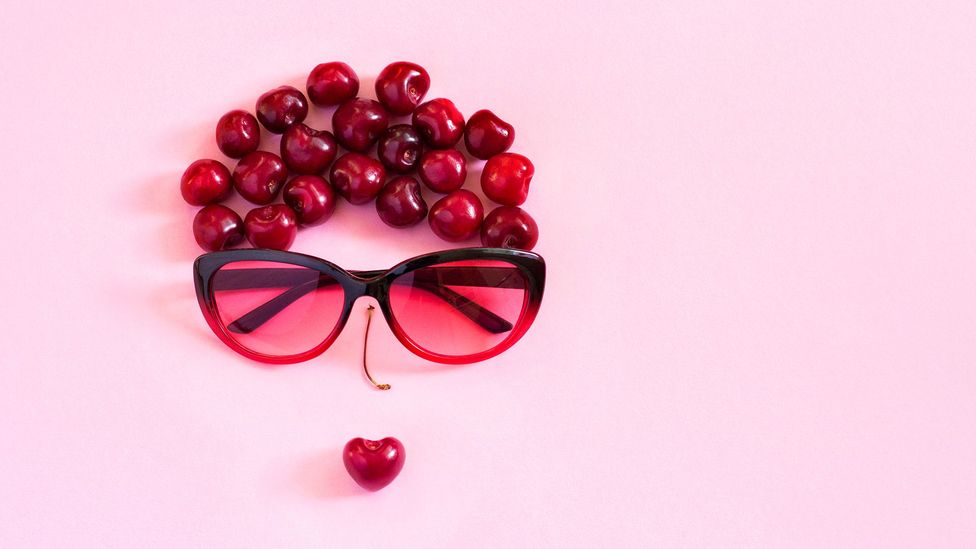
In older adults, consuming a sugary drink may make them more motivated and even happier during a task (Credit: Getty)
Younger adults showed increased free energy after consuming the glucose drink, merely it didn't affect their mood or retentivity.
Teaspoon of sugar
While current guidelines suggest that added sugars shouldn't brand up more than five% of our daily calorie intake, dietitian Renee McGregor says it'south important to sympathise that a healthy, balanced diet is unlike for everyone.
"I work with athletes who need to take on more than carbohydrate when doing a difficult session because it's easily digestible. Merely they worry they're going over the guidelines," she says.
For nearly of the states non-athletes, it's true that added sugar isn't crucial for a healthy diet. But some experts warn we shouldn't single it out equally toxic.
McGregor, whose clients include those with orthorexia, a fixation with eating healthily, says that it isn't healthy to label foods as "good" or "bad". And turning carbohydrate into a taboo may just make it more tempting. "Every bit soon as yous say you can't have something, yous desire it," she says. "That'due south why I never say anything is off-limits. I'll say a food has no nutritional value. But sometimes foods have other values."

Even when sweet foods have picayune or no nutritional value, they have other values (Credit: Getty)
Acquaintance professor at James Madison University Alan Levinovitz studies the relationship between religion and science. He says in that location's a uncomplicated reason we wait at carbohydrate as evil: throughout history, we've demonised the things nosotros find hardest to resist (think of sexual pleasure in the Victorian times).
Today, we do this with sugar to gain control over cravings.
"Sugar is intensely pleasurable, so we take to see it as a cardinal sin. When we see things in simple good and evil binaries, it becomes unthinkable that this evil thing tin can exist in moderation. This is happening with sugar," he says.
He argues that that seeing nutrient in such extremes can brand us anxious about what we're eating – and add together a moral judgment onto something as necessary, and every bit everyday, equally deciding what to eat.
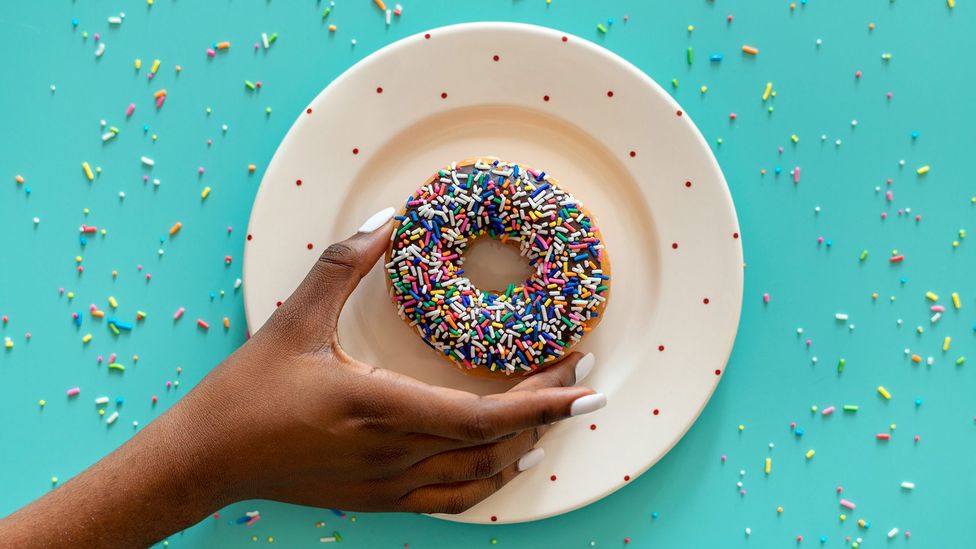
We demonise the things we find difficult to resist – including sugar (Credit: Getty)
Taking sugar out of our diets can even be counterproductive: information technology can hateful replacing it with something potentially more calorific, such as if you substitute a fatty for a sugar in a recipe.
And amid the ascent debate around sugar, we risk confusing those foods and drinks with added carbohydrate that lack other essential nutrients, similar soft drinks, with healthy foods that have sugars, like fruit.
One person who struggled with this distinction is 28-year-sometime Tina Grundin of Sweden, who says she used to think all sugars were unhealthy. She pursued a high-protein, high-fat vegan diet, which she says led to an undiagnosed eating disorder.
"When I started throwing up subsequently eating, I knew I couldn't go along much longer. I'd grown upwardly fearing sugar in all forms," she says. "And then I realised in that location was a departure betwixt added sugar and saccharide as a sugar and I adopted a high-fructose, high-starch nutrition with natural sugars establish in fruit, vegetables, starches and legumes.
"From the kickoff day, information technology was similar the fog lifted and I could see conspicuously. I finally gave my cells fuel, found in glucose, from carbohydrates, from sugars."
While in that location's disagreement effectually how dissimilar types of sugars affect our health, the irony is nosotros might be ameliorate off thinking about it less.
"Nosotros've really overcomplicated nutrition because, fundamentally, what everyone is searching for is a demand to feel complete, to feel perfect and successful," says McGregor. "But that doesn't be."
Correction: An before version of this story referred to glucose and sucrose as beingness manmade. This has been changed. An earlier version of the story also said that high fructose corn syrup doesn't lead to a rise in leptin; however, every bit most related research has been done on fructose, not high fructose corn syrup, this has been inverse. Sugar'southward effect on insulin and its relation also has been clarified.
Join 900,000+ Future fans by liking us on Facebook, or follow u.s. on Twitter or Instagram.
If you liked this story, sign up for the weekly bbc.com features newsletter, called "If You lot Only Read 6 Things This Calendar week". A handpicked selection of stories from BBC Futurity, Civilization, Capital, and Travel, delivered to your inbox every Fri.
Should I Be a Sugar Baby if Im a Virgin
Source: https://www.bbc.com/future/article/20180918-is-sugar-really-bad-for-you
0 Response to "Should I Be a Sugar Baby if Im a Virgin"
Post a Comment